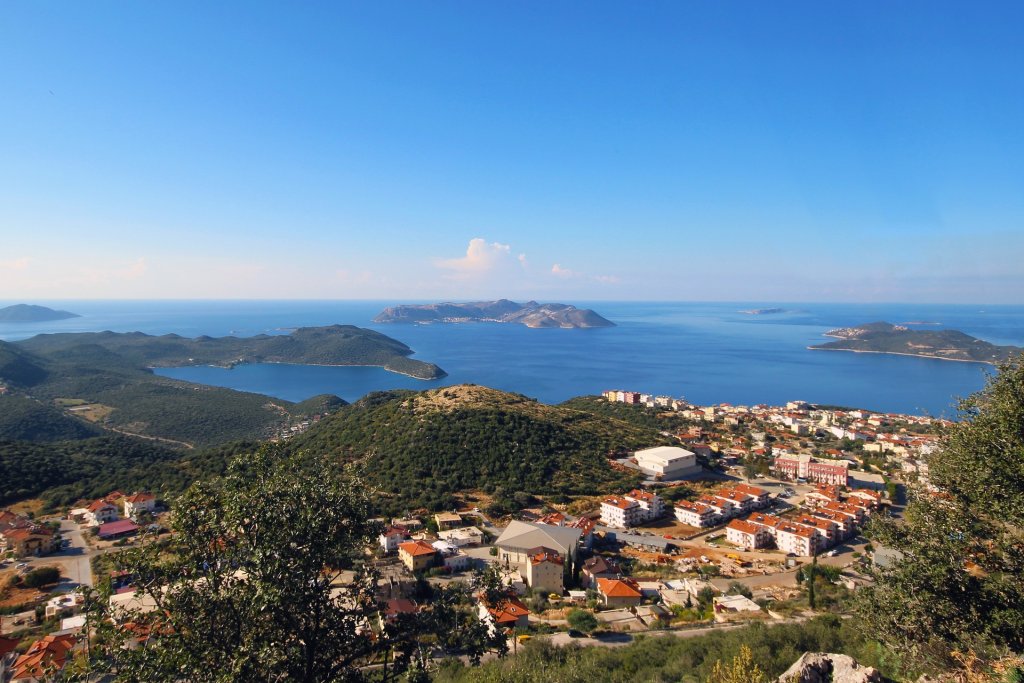
Militarization of the islands by Greece, which should be demilitarized according to their established status, is one of the most important disputes between Turkey and Greece in the Aegean Sea. Among these islands, Meis is particularly important, being the farthest from Greek mainland and closest to mainland Turkey. In addition to militarization, Meis also causes serious maritime jurisdictional debates due to its location. I here provide a short summary of the main arguments set forth by the two sides, Greece and Turkey, to clarify the disagreements.
Basic Information on Meis
Although its official name, Megisti (Μεγίστη), means largest-greatest in Greek, Meis is rather a small island of only 9.2 km2 with approximately 500 residents. It is a municipality of the Dodecanese in the Eastern Mediterranean and a regional unit of Rhodes. Its current name, which has been used since the 12th century, is Kastellorizo. The name probably comes from Castello and Rosso, which togather mean red castle in Italian. The Turkish names of the island are Meis and Kızılhisar (letter also means Red Castle in Turkish).
Meis Island was significant in terms of maritime navigation and trade during and before the Ottoman period. It later lost its importance to a large extent. Since water is scarce on the Island and agricultural opportunities are therefore limited, sponge diving and tourism are of vital economic importance today. It became a more popular tourism destination after Mediterraneo, a 1991 Italian war comedy-drama film shot in Meis, about a group of Italian soldiers stranded on a Greek island during the Second World War, received an Oscar. With the construction of an airport and the launch of ferry services from Rhodes, arrival to the island has become easier. There is sea crossing to Meis from Kaş (Turkey) as well.
The relations between the Greek islanders and the Turks are fine. The two sides often go shopping or vacation to each other. There are even marriages. When the islanders get sick, they mostly prefer Turkey instead of Rhodes for treatment. The island is only 2 kilometers away from Turkey, so an average athlete can swim easily. As a matter of fact, swimming competitions are organized between Kaş and Meis every year, where the two municipalities give the start together. Small boats can also reach the island in about 20 minutes. However, the close location of the mini-island to Turkey is also the main reason for the tensions with Greece.
The Main Maritime Jurisdictional Conflict on Meis Island
One of the two main disagreements on Meis is related to maritime jurisdiction. Greece argues that all island, whether small or sizable, have maritime jurisdiction on equal footing with mainlands. By asserting that the island of Meis has continental shelf and EEZ area just like the Greek mainland, Greece wants to combine the continental shelf and EEZ areas of the island of Rhodes, which is 78 miles away to Meis, with those of Meis embracing the entire area in between. In such a possibility, Turkey’s EEZ area in the Mediterranean would be restricted to the Gulf of Antalya.
Turkey, on the other hand, purports that the maritime jurisdictional areas of the islands cannot be the same as mainlands. It therefore refuses to accept the Greece’s claim to an area of approximately 40.000 km2 in the Eastern Mediterranean for an island of just 10 km2 in size with mere 500 inhabitants and located at a distance of 600 km from the Greek mainland and only 2 km from Turkey’s mainland. Since Greece claims a maritime jurisdiction area which is 4,000 times the area of that island, Turkey firmly rejects such a disproportionate demand, which would cause her to lose a huge area in the Eastern Mediterranean. On the contrary, Turkey claims a maritime jurisdictional area that extends from the Turkish mainland to the island of Cyprus.
The Legal Discussion on the Militarization of Meis
The second disagreement on Meis is related to its militarization by Greece. Meis, a part of the Dodecanese in the Eastern Aegean region, was ceded to Italy by the Treaty of Ushi, signed after the Tripoli War of 1912. The Island was ceded to Greece” with the 1947 Paris Peace Treaty signed between Italy and the Allies after World War II. Article 14 of the Paris Peace Treaty clearly states that all the fourteen ceded islands including Meis “must be demilitarized and should remain so”. Turkey’s objection to any militarization act on the Island is depended on such a clearly expressed provision of the Paris Peace Treaty.
Greece began arming the Eastern Aegean islands in 1960s. This has a direct connection with the tension that arose from Cyprus at the time. Facing Turkey’s reactions, Greece initially denied militarization but then began to argue that it had justified reasons. Looking specifically at Meis, although the issue has caused problems with ups and downs over the years, tensions rose recently when the images of a civilian ferry departing from Rhodes carrying fully equipped Greek soldiers to Meis in August 2020 were reflected to the media. After Turkey’s very harsh reaction, the Greek Ministry of Defense announced that the island of Meis was not armed, and the soldiers who came from Rhodes routinely changed the guard of the island. Besides that, frequent visits of the top Greek officialsincluding the President to the island, and the emergence of highly militarized images during these visits covering also the inspection of military units, are perceived as serious provocations.
Greece acknowledges that Paris Peace Treaty envisages the disarmament of the related islands. However, it claims that the contingent in Meis consists of a National Guard presence in accordance with the treaty on the Conventional Armed Forces in Europe (CFE). It also argues that Turkey, which is not a party to the Paris Agreement, cannot raise obligations or carry liabilities according to Article 34 of the Vienna Convention on the Law of Treaties as non-party state. In other words, Greece argues that Turkey cannot interfere with the implementation of an agreement to which it is not a party.
Besides these, Greece also claims that Turkey occupied Cyprus in violation of the Treaty of Guarantee in 1974 and showed the potential to apply the same to the Greek islands. Establishment of the Aegean Army in the Aegean part of Turkey’s mainland, which is capable of landing operations, is seen as another sign of threats to Greek islands. Even the occasional statements by the Turkish officials such as “we can come suddenly one night” and the popular social media maps showing the Greek islands as Turkish territory are all presented as similar signs by Greece.
In this context, Greece argues that, in accordance with Article 51 of the UN charter, it has the right to take the necessary military measures to defend her territory against the explicit Turkish threats.
On the contrary, Turkey claims it has no intention to threaten any neighboring state and instead sees the arming of the so closely located islands by a potentially foe state as a major security threat. In fact, the most important reason why these islands were given a demilitarized status from the beginning was to address Turkey’s legitimate security concerns.
In recent years, Turkey argues that these islands were ceded to Greece on the condition that they would be kept demilitarized, and therefore Greece’s sovereignty would become controversial if it did not stop this “material breach” of the related conventions. The rhetoric “we can come suddenly one night”, which was used in Cyprus and Syria before, has become popular again. In his speech, Minister of Defense Akar reminded that Meis was only 1950 km away, and the swimming standard of a Turkish Naval Academy student was 2000 meters. As a matter of fact, the swimming of military students to Tuzla Island recently, which is the same distance as Meis, was a warning message to Greece. Of course, these movements were also described as a provocation by Greece and were answered with similar arguments.
Conclusion and Evaluation
Despite its huge maritime jurisdictional effect and strategic location, Meis is just a very small part of the greater Aegean problems between Greece and Turkey. By pursuing above mentioned policies, Greece may be aiming to consolidate its full sovereignty over the disputed islands, to accustom Turkey to it, and at the same time, provoke Turkey to react violently leading to isolation from the West. Due to the large number of heavy weapons and bases deployed by the United States recently, the concern in Greece that Turkey might make a military intervention or landing operation tends to decrease. Therefore, armament attempts can become more overt than before.
An armed conflict between Turkey and Greece would be a disaster not only for both sides but also for the whole region. Turkey should use its recent diplomatic capacity strengthened by the mediation efforts at the Russo-Ukraine war, to convince Greece to sit on the negotiation table for all the problems in Aegean.
However this is not an easy task as Greece defends that many of the Aegean issues are not “disputes” at all, instead they are just illegal claims by Turkey. Greek officials believe, accepting to negotiate those issues would also mean opening Greece’s sovereignty to discussion. The explicit military and political support of the United States in recent years has further heartened Greece’s well known stance.
However, in terms of military capacity, Turkey also feels much stronger than before. Since even a small dispute between Turkey and Greece can quickly turn into a national cause on both sides, governments are constantly under great pressure and any step which may sound like a retreat or defeat can even cost them their positions. Therefore, it is unlikely that governments will try different and risky methods for a solution. As long as the Russia-Ukraine war does not lead to an unexpected development, there seems to be no hope that either the problem of Meis or the other Aegean Issues will be resolved in the short term. Turkey’s EU membership would soften the tension for sure, however even that would not guarantee a solution.

Assoc. Prof. Dr. Altuğ Günal, Ege University
Assoc. Prof. Dr. Altuğ Günal; received his BA and MA in International Relations from Ege University and his PhD in European Studies from Dokuz Eylül University (2011). He completed part of his Ph.D. lectures and doctoral dissertation at the University of Exeter and the University of Zagreb. He has also worked as a researcher or guest scholar at the Norwegian University of Science and Technology (NTNU), Aalborg University, University of Zagreb and University of Oxford. He taught Turkey’s internal and international interests at the Turkish Air Force Command and is still history consultant for the Cyprus Peace Operation Museum at the Foça Amphibious Marine Infantry Brigade. Currently, he is working as a lecturer and vice head of department at the International Relations Department of Ege University. His priority work and writing issues covers; Cyprus Problem, the Balkans, Humanitarian Interventions, Responsibility to Protect and the European Union.
To cite this work : Altuğ Günal, “The Importance of the Meis Island in the Greco-Turkish Conflict on the Aegean Sea” , Panorama, Online , 15 November 2022, https://www.uikpanorama.com/blog/2022/11/15/ag/
Copyright@UIKPanorama. All on-line and print rights reserved. Opinions expressed in works published by the Panorama belongs to the authors alone unless otherwise stated, and do not imply endorsement by the IRCT, Global Academy, or the Editors/Editorial Board of Panorama.


